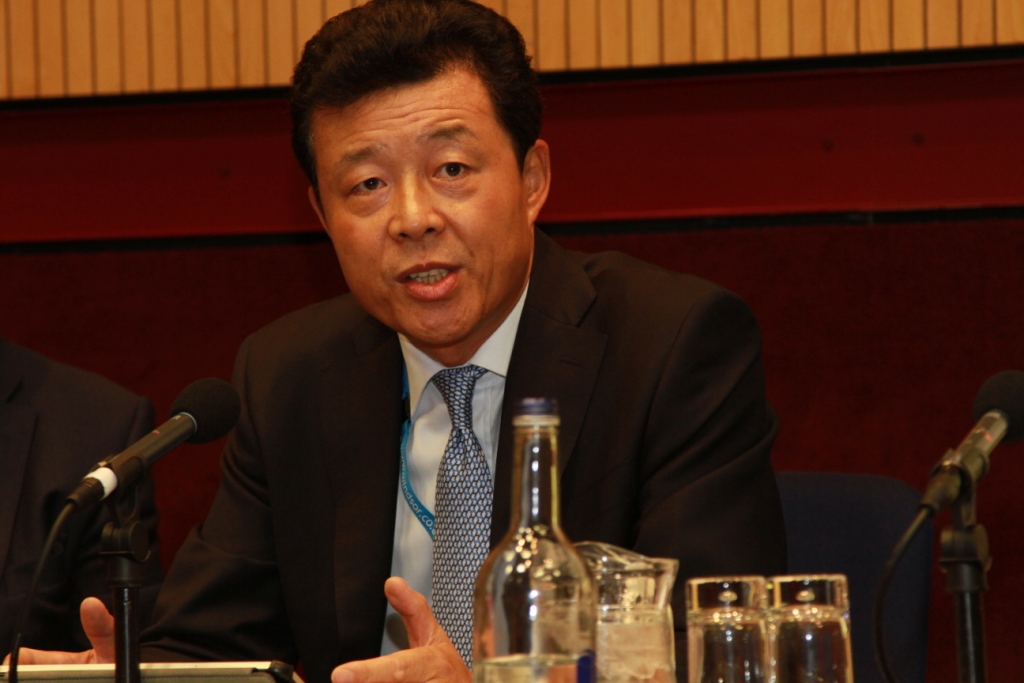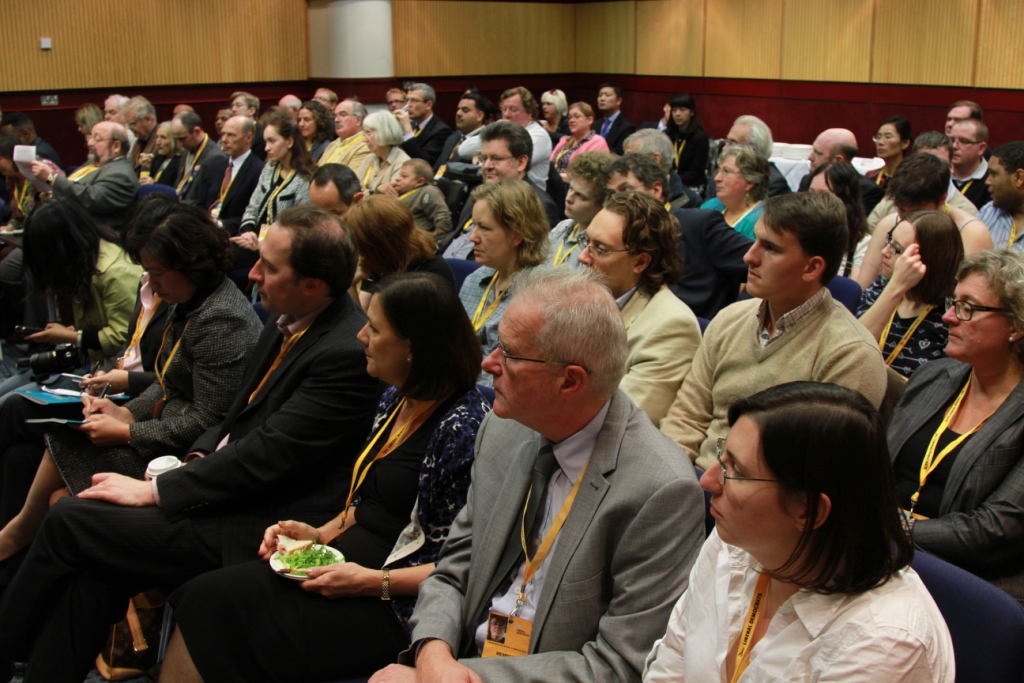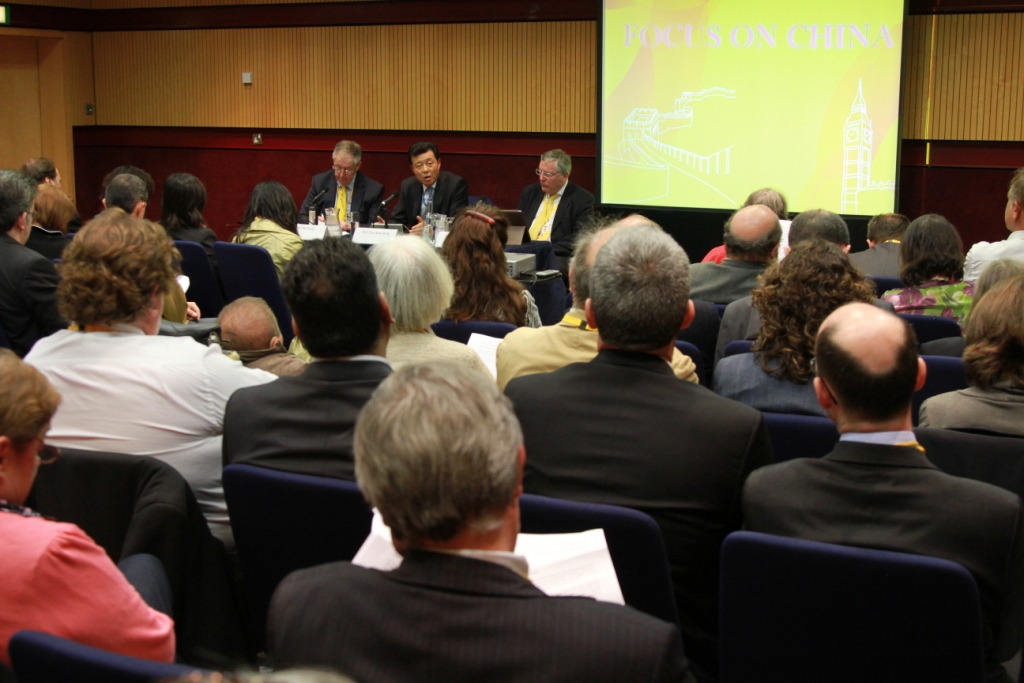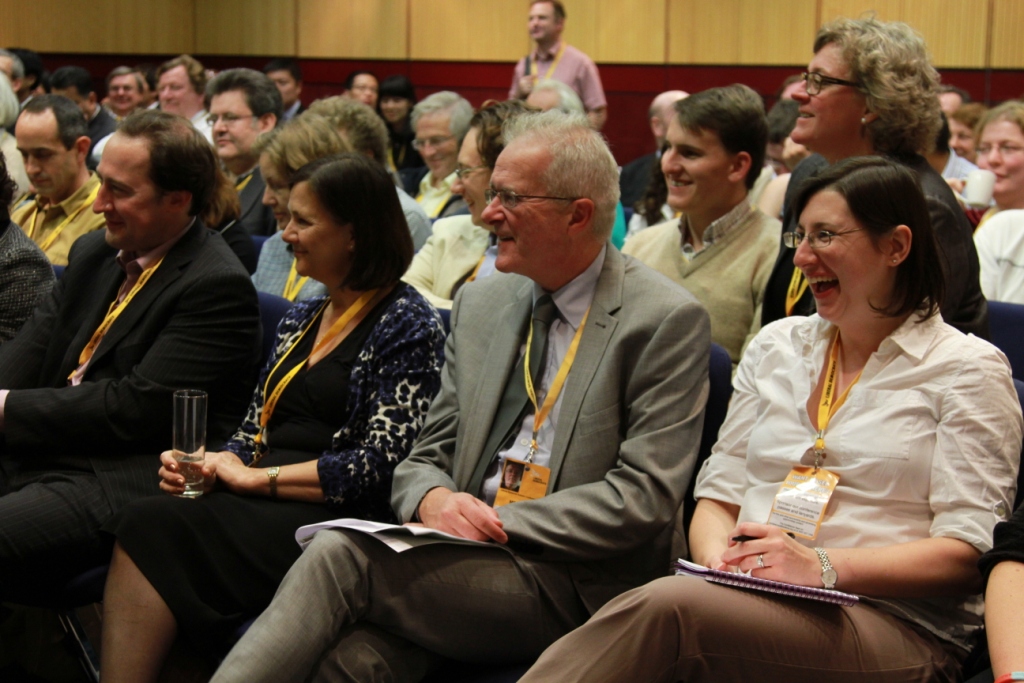|

Lord McNally,
Lord Clement-Jones,
Ladies and Gentlemen,
Welcome to this year's China Forum.
I am delighted to be addressing China Forum at your Party Conference.
I have warm memories of meeting with many of you at the China Forum we held last year in Liverpool.
I see this as an important opportunity to share ideas and strengthen our friendship.
Last year we explored what should be done to take China-UK relations forward. This year I hope we can use the China Forum to deepen understanding between our countries.
On this issue of understanding, I think a useful starting point is to analyse those issues about my country that are the focus of attention for the British media.
I suggest this approach since British media coverage is the primary source for many of you to know what's going on in China.
However, I must say at the outset that British media coverage on China is not anywhere near comprehensive, objective and fair.
British media generally places its attention on four areas:
· China's economic future.
· Political reform.
· Freedom and human rights.
· And foreign policy.
Let me take each in turn.
First, China's economic future.
Some observers suggest that China's economy is running out of steam. In early September, at the China Summer Davos in Dalian Chinese Premier Wen Jiabao reflected on the differing views about the Chinese economy.
Premier Wen said: "Some are optimistic about China's economic future, while some others say that China is in trouble. But we in China remain clear-headed and are firm in our confidence."
Let me analyse what some media describe as 'trouble'.
Some believe that China is under pressure from rising labor costs, more expensive Renminbi and higher dependence on imported resources.
Those commentators suggest that China's days as a 'world factory' are numbered and its growth is losing momentum. In addition they say that in China, a middle-income trap is looming.
Some take the recent tragic rail crash as a sign that the Chinese economy will "come off the rails entirely".
Yes, the Chinese economy is confronted with many challenges.
For example, the fragile global recovery and the bleak economic landscape in America and Europe.
At the same time, China must find a solution to many problems internally as well. Premier Wen Jiabao has publicly pointed to these facts in the Chinese economy:
· A lack of balance and coordination in development.
· Inefficient use of recourses.
· Environmental strains.
· Poor innovation capacity.
· And flagging demand and consumption.
All these cry out for effective responses.
Despite all these challenges, I'd like to bring to your attention these points.
For 32 years China has had consistent annual average growth of over 10%. Despite the turmoil in global financial markets over the past three years our economic fundamentals remain strong.
China is half way through industrialisation and urbanisation and we're moving faster to integrate into the global economy.
Other contributors to economic growth are:
· Our infrastructure building in roads, rail, air and seaports.
· Narrowing regional gaps and the urban-rural divide
· And encouraging greater domestic consumption.
China is still far behind developed countries in terms of per capita GDP. Ours is only around 10 percent of that of America and Britain; it is merely half of the world average.
Since China adopted its reform and opening up policies three decades ago, my country has industrialised at an unprecedented speed. This means China is on a journey from developing towards developed status. This has created a strong driving force for China to catch up with the developed countries.
In addition China is reorienting its development strategy and seeking solutions to its problems.
Early this year, China unveiled the 12th Five Year Plan, and it's being implemented with rigour. According to the plan China is taking these major steps:
· Readjusting its growth model.
· Restructuring the economy
· And improving public services.
China has also taken measures to slow down economic growth. The objective is to create a favourable macroeconomic environment to reach all the Plan goals.
As a result, in the first 6 months this year, the growth speed has stabilized at 9.6 percent. That's below the 10.4 percent full-year rate in 2010.
As Premier Wen Jiabao reflected at this year's Summer Davos held in China that we have many reasons to be confident about China's economic future.

Second, China's political reform.
A prevailing opinion in British media is that China only goes for economic reform, but not political reform.
As an ambassador I must be 'diplomatic' and avoid comment on political reform in Britain!
So let me focus on political reform in China.
The answer is clear. There is a political reform in China and it has never stopped.
In this significant reform, we have
● Put an end to lifelong tenure of leadership positions.
● Improved the system of people's congresses.
● Strengthened democratic institutions within the Party.
● And expanded democracy at the grass-roots level.
Our reform covers many aspects of the political life and its steady progress is there for all who choose to see.
One telling example is how the appointment system has been improved in China's Foreign Ministry.
Under the new scheme there must be a period of public consultation within the Ministry. This process is done before a Director, Director-General and even a Vice-Minister is appointed.
At the same time, a competitive system has been put in place to appoint senior officials. All these practices show how far China's political reform has come in many areas.
Then why do many outside of China still take the view that China has no political reform?
To answer this question, we need to clarify what kind of political reform they are talking about.
If China was judged by the standards of western countries, then people would come to the above conclusion. But the truth is, the western standards are not universal, and the western political system has its own flaws.
These problems have become more visible and better understood in the ongoing financial crisis. Some visionary people in the west have come out strongly in favour of a decisive reform.
This year China celebrated the 90th birthday of the Communist Party of China. It was a time to take stock of the extraordinary journey of the Party over 90 years. There was a consensus that the Party's success wouldn't have been possible without a commitment to move forward with time.
The Party is always ready to change. The Party has been bold enough to reinvent itself and it has never stood still.
The same is true of the political reform in China, which keeps going ahead amidst adjustment and innovation.
To sum up, it is China's relentless push to reform and strengthen its political institutions that has helped to deliver over 30 years of economic growth.
Most importantly, such reforms have also underpinned people's rising living standards and social stability.
There is a core yardstick with which to judge the legitimacy and effectiveness of a political system. The benchmark of the system is this:
· It matches well with the conditions on the ground.
· It contributes to the development of a country.
· And it promotes the well-being of all the people.
We believe China's political system is tailored to our national circumstances.
The evidence is that the system has contributed to national prosperity and a better life for the people.

Third, freedom and human rights in China.
In this regard, British media leaves the impression that it has a bias towards the sensational and the negative. It would seem that all it cares for is a few so-called 'dissidents'. If Chinese media only ever reported about the so called troubles of Northern Ireland over the past few decades, that clearly would give a much distorted view about life in Britain as a whole.
However, if you ask the average Chinese about their views, you would find they care little about those 'dissidents.' They may compare their freedom with the past. They may also point out that they are freer and happier than any time in history.
China's 485 million internet users and 200 million micro-bloggers are also a key voice on this issue. They speak their minds on political and public affairs online and by micro-blog. In many cases, one single issue may attract the attention of millions in cyberspace and tens of thousands of comments may be posted online.
China is talking about exploring new approaches to the relationship between people and government At the heart is a desire by the government to encourage the public to be leading players in the society. The internet and micro-blogs have every potential to be an effective platform for the public to be heard, and for the government to hear their concerns.
Of course, either in our daily life or in cyberspace, freedom is a relative concept. Freedom must operate within the boundary of laws and ethics.
China and the developed countries like Britain are quite often at odds over where the boundary of freedom lies. Part of our differences is about values, and part of them is cultural and social.
In Asian cultures, collectivity is more important than individual rights. Responsibility always outweighs freedom. This is quite different from the pursuit of absolute individual freedom by the western countries.
China in the past two centuries went through too much turmoil and instability. That is why we Chinese people highly treasure social stability. We will not allow our development efforts to be disrupted or damaged in any way.
China is strengthening its legal framework and promoting the rule of law. We are determined to maintain social stability according to law.
In China, people are all equal before the law. They have the protection of the law and at the same time must act within the law. Anyone, whether they are a 'dissident' or not, must be held to account if he or she breaks the law or damages social stability.
Stability, like air, may not be felt if it is present. But its absence may threaten people's survival.
Maybe the importance of stability was more apparent to the British people after the August riots in London.

Fourth, China's foreign policy.
Recently, China has been labeled by the western press as getting assertive. Headlines touched on territorial issues in the South China Sea. Then there was China unveiling an aircraft carrier. And how China pursues neo-colonialism in Africa.
It's true that China has maritime territorial disputes with some neighbours. But we always show restraint and seek diplomatic and negotiated solutions. This is the way to uphold sovereignty and regional peace and stability. China will not threaten or intimidate smaller, weaker countries. Yet at the same time we will not allow anyone to damage our interests or encroach upon our territory.
China does have one aircraft carrier now, and it is not yet in service. China seeks to have an aircraft carrier as this is necessary for the protection of territorial sovereignty and maritime interests. China has an 18,000-kilometre coastline. In addition China has under its jurisdiction 3 million square kilometers of waters under the United Nations Convention on the Law of the Sea.
In contrast, America today has 11 aircraft carriers in service and the latest super carriers are already under construction. Britain plans to build two Queen Elizabeth class aircraft carriers. And even such developing countries as India, Brazil and Thailand have deployed aircraft carriers. Therefore, I don't see why people should take fright at China's refitted aircraft carrier.
Turning to China-Africa relations. Our cooperation with Africa has a long history. Starting from the 1950s, China has provided substantial financial aid and sent nearly 20,000 medical workers to Africa.
We have built over 2,000 kilometres of rail line, more than 3,000 kilometres of highway, 100-plus schools and 60 hospitals on the continent.
Over the past decade, we have cancelled over 20 billion yuan, or roughly 2 billion pound of African debt. In recent years, apart from aid, we have made more investment and run more joint-production programs in Africa. These are government-led, commercial programs where companies are major players. This is a win-win cooperation model for both China and Africa.
To highlight its commitment to peaceful development, the Chinese government recently published a White Paper on China's Peaceful Development. The White Paper reaffirms to the world China's commitment to a path of peaceful development and its dedication to world peace.
We seek common development and shared prosperity with the world. This is our sincere aspiration and it has been matched with firm actions.
These are the thoughts I'd like to leave you with about China. I hope they can offer you new perspectives when you read about China in the British media or deal with China.
Of course, I'm not speaking about all of British media. In the UK there's no shortage of far-sighted people and even-handed views about China.
What has encouraged me in particular is that I found a new word in British newspapers on relations with China.
That word is 'embrace'.
As you may be aware, 'embrace' is not what we Chinese always do traditionally to show goodwill and respect.
But when you want to 'embrace' us, we will surely open our arms warmly.
Thank you!

|

